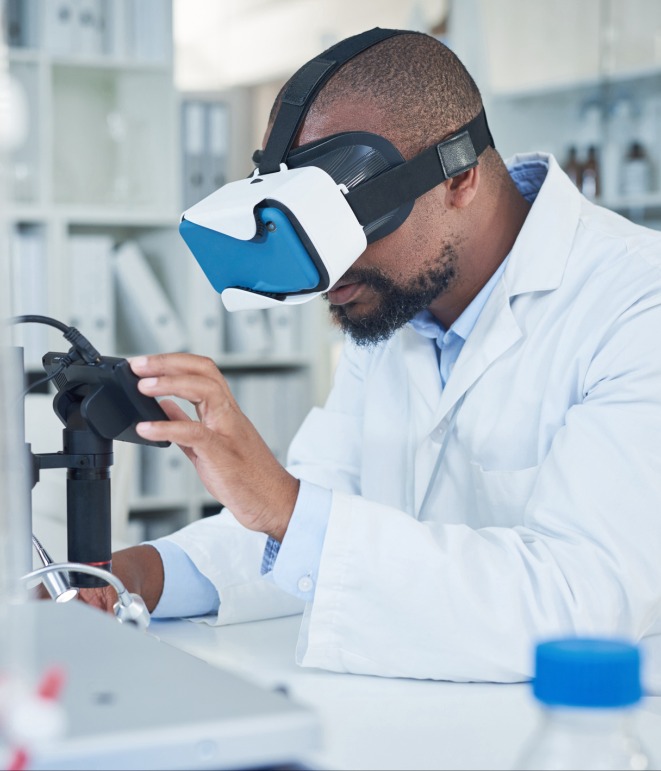
Rethinking Audit Regulation: Why Testing Should Come Before Mandates
Leventhal professor Clive Lennox proposes a new approach to audit regulation to measure policy effectiveness prior to broad implementation.
Neely Center Unveils Purpose-Driven XR Library
Neely Center Unveils Purpose-Driven XR Library
A new database prototype catalogs XR programs with positive use cases in healthcare, accessibility, and learning.

Neely's Purpose-Driven XR Library is creating positive impact in the emerging market.
[iStock]
The Neely Center for Ethical Leadership and Decision Making is changing the conversation around extended reality (XR) with the beta launch of Neely XR Purpose-Driven Library, a curated database of innovative virtual (VR) and augmented (AR) reality resources and programs focused on social good and improving lives.
Beyond XR experiences that offer people a space to play games or virtually hang out, the Neely Library will include programs that have specific and positive uses. Neely Center Director Nathanael Fast said the database is aligned with the center’s mission to empower leadership at the intersection of ethics and technology.
“We wanted to build tools that advance the conversation in the field toward purpose-first technology development as opposed to a container-first or metaverse-first approach. This [library] is meant to inspire others in the field to do that work,” Fast said.
The library was announced by Carsten Becker, cofounder of the XR library and lecturer of communication and design at USC Iovine and Young Academy, on June 21, during the culminating event for Neely Ethics and Technology Fellows Program, in which MBA fellows presented their own research on the future implications of VR and AR technology.
The initial idea for the library, according to Becker, comes from a purpose-driven view of the XR space, focusing more on productivity and positive impact than traditional uses like social media and gaming. By offering specific use cases, they believe the database will engage experts as well as the general public.
“We started to look at real world cases: How do people actually use this technology to help others in real life, not in some imagined worlds?” Becker said.
In developing the library’s catalog, the team concentrated on five sectors: health, education, access, social awareness, and general advancement of the field. Each application had to have a specific use case that had a clear positive impact. The process was anything but simple, as Fast, Becker, and the team of Neely fellows vetted over 100 options before choosing the initial 22 that now appear on the website.
Our primary goal is to ensure that the field advances in an ethical way or a human-centered way.
— Nathanael Fast
Director, Neely Center
The first batch of applications include: a spatial audio app that assists vision-impaired people, a VR surgical training platform that helps surgeons practice new procedures using virtual run-throughs, a suite of VR experiences that gives healthcare workers and caregivers a first-hand perspective on what it’s like to live with various conditions, and more. Additionally, the library features immersive, historical experiences and kid-friendly learning assistants.
According to Fast and Becker, these purpose-driven programs contrast other mainstream VR releases that focus on societal benefit over profit shares.
Despite efforts to boost the VR market (e.g. Meta pouring billions into VR development), the market has continued to shrink, and the Apple Vision Pro has largely underperformed its early sales targets. Desperate to salvage the underwhelming release, Apple is seeking a “killer app” to energize consumers and boost sales.
Though not their intention, Fast and Becker’s focus on utility-forward applications could be the future of XR.
“XR needs to get to a point where there’s clear utility and then it might become mainstream,” Becker explained. “For this library,… it’s more about saying, ‘this is a great application of this technology that helps people.”
Fast and Becker developed the library alongside the Neely fellows’ XR research, which highlighted potential use cases in the fashion industry, dangers in omnipresent advertising, and safety precautions for children and teenagers using VR headsets. The fellows assisted the pair in analyzing and selecting the 22 applications. In fact, Fast and Becker said the Neely Fellows program was such a success, they’re considering keeping the focus on XR technology in the coming year.
They also noted the extensive support received from USC Marshall, especially Dean Geoff Garrett, who has backed Neely’s efforts in ethical technology and leadership from the start of his tenure.
“Dean Garrett has been incredibly supportive. Marshall has been really committed at every step of the way to help us with the ethics of technology,” Fast said.
Looking ahead, the pair intends to expand the library with more purpose-driven applications, some of which are already under consideration. Ultimately, Fast says the website will add to the Neely Center’s suite of ethical technology tools, the Social Media, Artificial Intelligence, and Mixed Reality Indices, as well as their Design Codes for Social Media.
RELATED
Rethinking Audit Regulation: Why Testing Should Come Before Mandates
Leventhal professor Clive Lennox proposes a new approach to audit regulation to measure policy effectiveness prior to broad implementation.
From AI Club to Google Internship: A Q&A with Student Leader Francesca Kubica
MAIA executive director and Marshall student Francesca Kubica discusses student leadership and translating AI education into industry experience.
The Driverless Future is Coming. Will a Safety Net Follow?
With the rise of driverless cars like Waymo, Assistant Professor Georgios Petropoulos analyzes how legislation could provide a safety net for workers impacted by the growing market.
Why “Inefficient” AI Spending May Power Future Growth
New research finds companies investing heavily in new technologies despite low returns are often the ones driving tomorrow’s economic progress.
Forbes 30 Under 30 Entrepreneur Shares His Journey from Business School to Startup Success
Bobby Pinckney ’20 is creating impact with innovative technological ventures and inspiring new Trojans to shape the future.